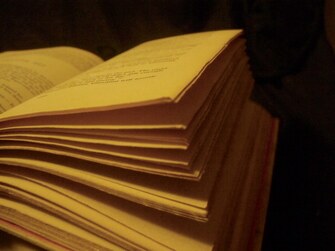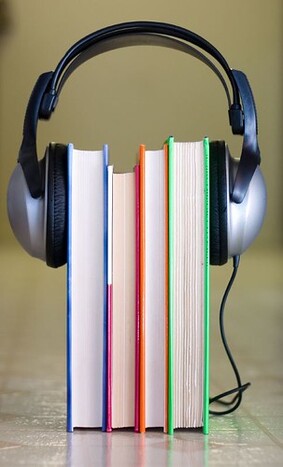|
by Georgia I. Salvaryn  "open book pages" by Jo Naylor CC BY 2.0 "open book pages" by Jo Naylor CC BY 2.0 It has long been debated whether audiobooks are better than traditional books and e-books, but it is an argument that has no end. While some people believe audiobooks are eventually going to take over the reading world, others believe traditional books and e-books will have a long-lasting existence and influence on the book-loving community. Eventually, one’s use of audiobooks or print media comes down to two factors: ease and enjoyment. In Dina Folgia’s opinion editorial Why the Future of Writing is in Audio, she discusses the revolutionary addition of audiobooks and storytelling podcasts to the literary world and the growing popularity of this form of “reading.” She argues that readers will eventually turn to audio for better entertainment and for convenience (i.e., a reader can listen to their favorite actor read their memoir while driving to work.) Her conclusion: It’s no secret that print media is on the out. It will never go away, not completely, but the shift to the digital sphere has removed the emphasis from physically published content. Audio has already begun to breathe new life into old genres like horror, and is extending far beyond the conversational sphere and into the world of narrative. Writers would be foolish to overlook this massive new platform for creativity. While I agree that this electronic medium is on the rise, I do not believe that it will kick print media to the curb.  "Audio Book Concept (for iStock)" by dalydose is licensed under CC BY-NC-SA 2.0 "Audio Book Concept (for iStock)" by dalydose is licensed under CC BY-NC-SA 2.0 There will always be a need for print media and that group of people that prefer traditional books over audio and digital platforms. I find it much easier to learn and concentrate when I’m holding a book in my hands rather than staring at a tablet or listening to an audio recording. Also, there is nothing better to me than the feeling of smooth book cover, the joy of turning the pages and reaching the end; I imagine it is similar to the feeling of climbing the top of Mount Everest after a long and laborious journey. I have read about some of the benefits of audiobooks: the cadence of the reader, the inflections of their voice. In Time Magazine’s article Are Audiobooks As Good For You As Reading? Here’s What Experts Say, Markham Heid writes: "Listeners...can derive a lot of information from a speaker’s inflections or intonations. Sarcasm is much more easily communicated via audio than printed text. And people who hear Shakespeare spoken out loud tend to glean a lot of meaning from the actor’s delivery.” It makes sense when I think about the difference between watching a movie adaptation of a book and reading the book itself; the actors and actresses sometimes give scenes a whole new tone and meaning in the movie than how I read it in my head. At some point in our lives, we all probably have had a text read to us, whether it was a bedtime story from a parent or a classmate reading from a textbook in class. In Audiobooks VS Reading: The Rules Are, There Are No Rules, writer Dana Lee suggests listening to comedy audiobooks and memoirs to warm up to the medium. And while I haven’t tried listening to Bruce Springsteen’s audiobook, Born to Run, (yet!) I would still prefer to read the book at my own pace and in my own time. As someone who has struggled with dyslexia all my life, I have tried different techniques to help improve my reading abilities. From CliffsNotes to ebooks to audiobooks, I couldn’t find a medium that felt “more comfortable” to work with. At one point, I was using an app called Learning Ally (made specifically for people with dyslexia and learning disabilities) that would read the text aloud to me, while simultaneously displaying the highlighted text on my Kindle screen so I could read and follow along. While this app was somewhat helpful, I found myself getting easily distracted and constantly having to rewind or reread the text (or the battery on my device would die and I would have to wait for a significant charge before I could continue listening and reading). Sure, it is exhausting and frustrating to get through texts sometimes, especially when I’m tired, but I find old-fashioned reading to be more helpful and rewarding.  "Headphone" by nSeika CC BY 2.0 "Headphone" by nSeika CC BY 2.0 So which is ultimately better: reading books or listening to audiobooks? The answer is: it depends. According to Daniel Willingham’s New York Times article, “Is Listening to a Book the Same Thing as Reading It?,” “examining how we read and how we listen shows that each is best suited to different purposes, and neither is superior.” Willingham, a professor of psychology at the University of Virginia, infers that, when reading for pleasure, the process in which the reader experiences the text is no different. The only difference Willingham points out is prosody in audiobooks, “the pitch, tempo and stress of spoken words.” However, when it comes to what he classifies as “difficult content,” reading still the preferred mode, as it “supports readers through difficult content via signals to organization like paragraphs and headings, conventions missing from audio.” In the end, Willingham concludes that “audiobooks won’t replace print because we use them differently.” In “Why Listening to a Book is Not the Same as Reading It,” published in Psychology Today, Ph.D. student Cody Kommers argues that Willingham doesn’t address the biggest difference between the mediums: engagement. When comparing reading to listening, Kommers explains that reading is the act of engaging with the text, while listening to a text is something that happens to you: “The words on the page aren’t going to read themselves...Audiobooks, on the other hand, make progress with or without your participation.” This reason is exactly why I don’t favor audiobooks: I will eventually zone out and miss, if not pages, chapters of a book that I’m supposed to be listening to. Both articles mention the fact that when a reader uses the auditory option, they are likely multitasking while listening, whether it’s driving their commute to work, working out in the gym, or cooking dinner in the kitchen. While this is acceptable and convenient for many people, it is not as “convenient” for me. I am a poor listener when multitasking and prefer the personal experience of reading; sitting quietly and comfortably in my bed while the voice in my head creates the voices of characters, my imagination painting vivid pictures as I slowly make my way through the pages, the chapters.  Suzy Hazelwood via pxhere.com Suzy Hazelwood via pxhere.com Over the years, as I have read more and pushed myself to read faster, I have seen a great improvement in my reading ability. While it does take me a great deal of time and effort to make my way through a book, I feel a sense of pride and accomplishment at the end. Listening to audiobooks and storytelling podcasts is easier and more convenient for some, and according to Dina Folgia’s op-ed, they will eventually dominate traditional reading in the literary world. But printed text is my preferred medium, and traditional reading will live on through people like me.
1 Comment
pizza
1/23/2024 12:03:57 pm
:)
Reply
Leave a Reply. |
Archives
July 2024
Categories
All
|
|
Glassworks is a publication of Rowan University's Master of Arts in Writing 260 Victoria Street • Glassboro, New Jersey 08028 [email protected] |
All Content on this Site (c) 2024 Glassworks
|

 RSS Feed
RSS Feed
